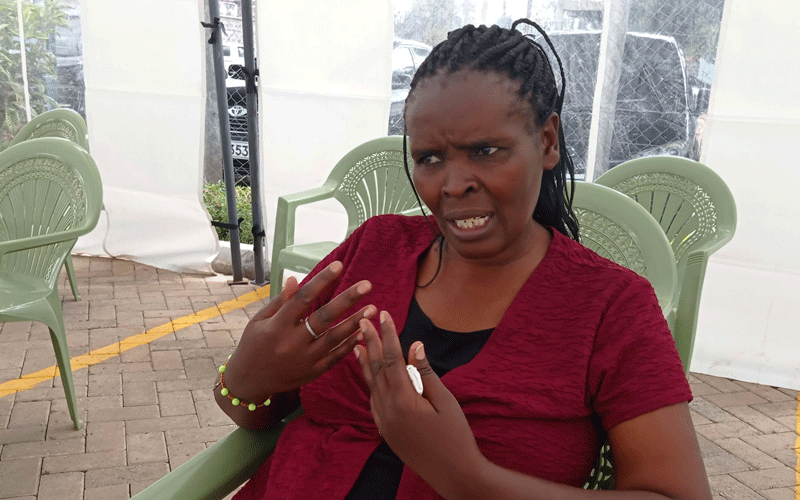Palliative care saved my life

Although a misunderstood aspect of healthcare, it became a life saver for Perpetua Ngumi and Florence Nyambura, and experts now urge more Kenyans to consider it.
Milliam Murigi @millymur1
When Perpetua Ngumi was diagnosed with stage 3B cervical cancer in 2004, she never thought there was any chance she would survive it.
Therefore, even going for radiotherapy, chemotherapy, and black therapy was a waste of time and resources to her. But because her doctor insisted, she had to do it.
“All I was thinking then was death. I had lost hope in everything. I thought I was dying.
Little did I know that everything happens for a reason,” says the 51-year-old.
When she thought everyone was done with her, her doctor at Kenyatta National Hospital proved otherwise.
She was referred to Nairobi Hospice for palliative care services. Since she had no idea about hospice and palliative care she heeded to the doctor’s call and she says since then her life has changed completely.
“When I got to Nairobi Hospice, my personal and medical history was collected.
Though at first, I was hesitant. After the team explained to me about it, I decided to give it a try,” she says.
Fulfilled lives
Palliative care involves patients with active, progressive, far-advanced disease.
The goal is to improve quality of life for people with serious or life-altering illnesses.
It’s sometimes called supportive care and improves overall wellness, including physical, emotional, spiritual, and social well-being of a patient and the caregivers. However, people have a lot of misconceptions about what it is.
“Many people think palliative care is just about pain management when a person is in the final months of their life, but this is not true.
Palliative care addresses both the symptoms and the stress of living with a chronic illness.
It also involves support for loved ones or caregivers,” said Ruth Ng’onyere, chief executive officer at the Nairobi Hospice.
For the 16 years, palliative care has kept Ngumi going even in the moments when she felt like life was meaningless.
The hospice has been providing food for her family when need be, supplied her with medicine, and when she cannot manage to visit the centre, the team visits her at home to know her progress.
The best thing is that palliative care is provided along with curative treatment.
She says that the facility has been her source of strength and has played a big role in helping her deal with pain in addition to offering psychological support through counselling.
Because of this facility, Ngumi now has a reason to believe that there is life after cancer.
“I never thought I would live this long because my cancer had metastasised to my spine.
But since I started receiving this care, things have changed and I have even lived beyond my expectation.
The counselling we get cannot be compared to what we get at the hospital. Attendants here are friendly; the care I receive here is always tailored for me,” adds Ngumi.
The centre also offers therapy sessions bi-monthly where different patients come to share their experiences, motivate each other, share a meal, and by the time they leave they go back home happy.
For Florence Nyambura, another cervical cancer survivor helping other patients live more fulfilled lives even when medical records state otherwise is what inspires her to offer counseling services and hope through her own story. Since 2012, Florence has been battling cervical cancer which has left her with a nerves problem.
“Before I was put under palliative care, I was a volunteer at Nairobi Hospice.
When I was diagnosed with stage 1B cervical cancer I didn’t hesitate to come here for the care and up to now am always here to talk to other patients and give them hope.
I believe that if I managed to live I should also encourage those who feel as if life has come to an end because of that terminal disease,” said Nyambura.
Contrary to the belief that palliative care is only available at the end of life, Ng’onyere says that this care can be started at any time when a person has a serious illness. In fact, the earlier you start, the more benefit you’re likely to get from your care.
Donor funds
Studies show people who receive high-quality palliative care from early stages of their illness, along with best-practice medical care, have better outcomes than people who only receive late palliative care.
“Patients who usually receive palliative care live longer compared to those who don’t receive this care.
Our aim as an organisation is to put life into our patients’ days and not just days into their lives,” she adds.
According to Dr Zipporah Ali, founder of Kenya Hospice and Palliative Care Association (Kephca), palliative care is a multidisciplinary practice usually delivered by a team of experts, including doctors, nurses, social workers, and caregivers.
The care can also be provided whether an illness is potentially curable, chronic, or life-threatening and is appropriate for patients with non-cancer diagnoses such as Non-Communicable Diseases as well as children.
“People often believe that palliative care is only provided in hospitals and hospices, and only for people who are approaching the end of their life.
However, I would like to say that one of the biggest benefits of palliative care is that it can be provided in your own home where you feel most comfortable,” says Dr Ali.
However, despite all the benefits that have been documented about palliative care, it is still underutilised in management of advanced or terminal illnesses.
In Kenya alone, about 1.5 million people require this service yet only 10 per cent can access it.
“Palliative care is a human right and it should be integrated to all levels of health care.
A lot more funding needs to be put aside for hospice and palliative care since this is one of the sectors, which is also 100 per cent donor reliant,” said Ali.
She adds that most Kenyans have not embraced this care because it is believed to be expensive, which is not true. She urges Kenyans to embrace it since it is a cost-beneficial service and it has more benefits than most people think.
“Palliative care also includes a much wider range of care services than most people are aware of. Some of these services include preventing and relieving pain and discomfort, managing medications to minimize side effects, managing symptoms other than pain, including psychosocial and spiritual symptoms, help with decision making about treatment options, and providing emotional support for individuals and family members,” she adds.
She reveals that people who receive early palliative care usually have fewer symptoms, improved mood, and better quality of life.
Though cancer is one of the most common illnesses associated with palliative care, as both symptoms and treatment can have a significant impact on a patient’s quality of life, Ali says providers have gone a notch higher and they are now offering this care to patients suffering from other non-communicable diseases and some communicable diseases.
But how different is palliative care from hospice care? Ali says the two are almost the same, but in contrast, hospice care is only available at the end of life when an illness is no longer responding to curative treatment.
At this time, the individual may decide to stop treatment and begin hospice care, also known as end-of-life care.
“Hospice is a type of palliative care provided when curative treatment is no longer beneficial or desired, and when life expectancy is measured in months or less.
It supports patients and their families while focusing on symptom relief and comfort,” she adds.
Hospice care provides better symptom management and quality of life compared with usual (cure-directed) care.
Studies show that patients who receive hospice care have improved quality of life, with less depression and symptom burden; feel more in control; can avoid risks associated with treatment and hospitalisation, and have decreased costs with improved utilization of health care resources.
According to Ali, several factors may account for the underutilisation of hospice care, including confusion about the terminology, misconception about its intent and scope, concerns about cost and insurance coverage, and potential mistrust because of perceived economic motives.
“Perception that hospice care is economically motivated has been a major reason as to why Kenyans have also not embraced this care.
The fact is that the cost of hospice care is likely equal to that of usual care. I would urge Kenyans to embrace both cares because these cares help to declutter our hospitals,” Ali says.
Her call to the government is to ensure that these services are available in all public hospitals, they are part of the universal healthcare program, and they are covered by the National Hospital Insurance Fund.









